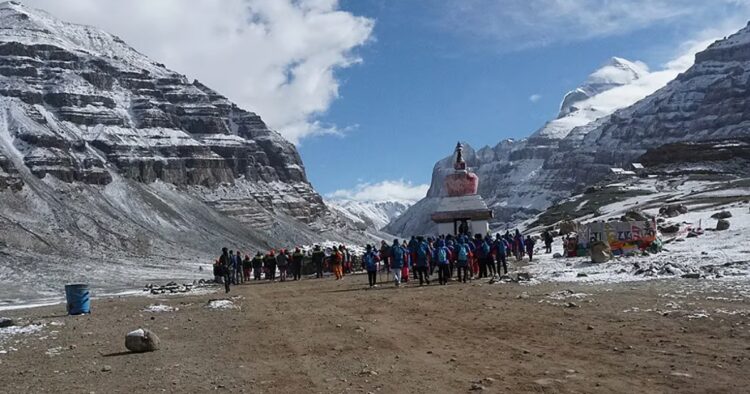KEY POINTS
- India and China are close to finalising an agreement to restart the Yatra after its suspension since 2019
- MEA to hold a key meeting on April 21 as preparations accelerate
- Pilgrimage costs to rise this year due to revised transport and accommodation rates
Efforts between Indian and Chinese officials to resume the Kailash Mansarovar Yatra have gained momentum, as the deadline for selecting pilgrims is just a few weeks away. The Yatra, a spiritual pilgrimage that takes Indian devotees to the sacred Mount Kailash and Mansarovar Lake in Tibet, has remained suspended since 2019.
According to sources familiar with the discussions, both countries have held detailed talks in recent weeks and are reportedly close to reaching an agreement. Officials have confirmed that most of the hurdles have been addressed, especially in terms of improving infrastructure and reviving logistical arrangements on both sides of the border.
The Ministry of External Affairs (MEA) has called a meeting on April 21 with all relevant departments involved in the Yatra. This includes the Ministry of Home Affairs, Indo-Tibetan Border Police, and officials from the governments of Uttarakhand, Sikkim, and Delhi. Their aim is to finalise preparations and ensure that the Yatra can restart smoothly once the agreement with China is formalised.
An official from the Kumaon Mandal Vikas Nigam confirmed that arrangements are being made to transport pilgrims by special vehicles from Dharchula to Lipulekh Pass. This step will eliminate the need for an 80 to 100 km trek, making the journey significantly easier and safer for the devotees.
Pilgrims will have to pay more this year compared to six years ago. Officials say the cost of accommodation and transportation has increased, with both Indian and Chinese authorities revising their rates. However, despite the higher expenses, thousands of hopeful devotees are eagerly waiting for the Yatra to resume.
The Kailash Mansarovar Yatra was previously conducted every year between June and September. It was halted in 2020, initially due to COVID-19 concerns, and later because of rising tensions between India and China following the Galwan Valley clashes. Since then, all facilities provided by China for Indian pilgrims have been withdrawn.
In earlier years, the selection of pilgrims was done through a computerised lottery system in early May. Authorities are now racing against time to finalise the resumption agreement, as any delay could shorten the window for the pilgrimage season or even risk its cancellation for another year.
The resumption of the Yatra has been taken up at the highest diplomatic levels. It was discussed during a meeting between India’s External Affairs Minister S. Jaishankar and Chinese Foreign Minister Wang Yi on the sidelines of the G20 Summit in Brazil. Earlier, in January, Foreign Secretary Vikram Misri visited Beijing and placed the Yatra resumption as a top agenda item.
In an unexpected move, the issue was even brought up at the 33rd meeting of the Working Mechanism for Consultation and Coordination (WMCC), which generally focuses on India-China border issues. This shows how significant the pilgrimage is for India, both religiously and diplomatically, and indicates the strong push from Indian officials to revive it this year.
India-China Cooperation Beyond the Yatra
A joint statement from the WMCC meeting noted that both countries discussed ways to revive cross-border exchanges, including cooperation on trans-border rivers and the Kailash Mansarovar Yatra. There are also talks underway to resume direct flights and issue visas more freely between the two nations.
The Yatra is organised with the cooperation of multiple Indian agencies and is conducted through two official routes: the Lipulekh Pass in Uttarakhand, operational since 1981, and the Nathu La Pass in Sikkim, opened in 2015. These routes allow Indian pilgrims to travel to Tibet, where Mount Kailash and Lake Mansarovar are located.
In Parliament, the Minister of State for External Affairs, Kirti Vardhan Singh, confirmed the government’s commitment to restarting the pilgrimage. He stated that the issue would continue to be pursued with Chinese authorities in all official interactions.
As both sides edge closer to an agreement, the hopes of thousands of Indian pilgrims are rising. If all goes well, the sacred journey to Kailash Mansarovar, paused for five years, could soon be back, marking a symbolic step forward in both religious sentiment and diplomatic cooperation between India and China.

















Comments